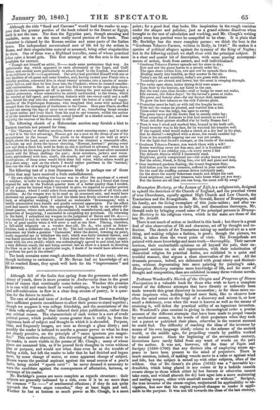Although full of the faults that spring from the greenness
and suffi- ciency of youth, there is more promise in Ambarvalia than in the great mass of verses that continually come before us. Whether this promise is to run wild and waste itself in wordy nothings, or be taught by study and self-cultivation to flow in a clear deep stream of poetry, is a ques- tion for the future to resolve.
The cast of mind and taste of Arthur H. Clough and Thomas Burbidge have sufficient generic resemblance to allow their poems to stand together; though we suppose it was college friendship, and the associations of the " idem vette atque nolle," that induced their joint publication, rather than any critical reason. The characteristic of each writer is a sort of crude Ipoetical power, which probably seems greater than it really is, from the vagueness both of subject and thought in which it is shrouded. Purpose, ideas, and frequently images, are seen as through a glass dimly ; and Possibly the reader is induced to ascribe a greater power to what he does not clearly perceive, on the principle of " mine ignotum pro magni- fieo." This careless obscurity, this throwing of fragments as it were to the reader, is more visible in the poems of Mr. Clough ; many of whose pieces are unnamed bits, as if he poured forth thoughts in verse without Plan or purpose, and would not when done even be at the trouble of finding a title, but left the reader to infer that he had finished and begun anew, by some change of metre, or some apparent change of subject. Horace warns the poetical aspirant against the usual source of a poet's
faults, being misled specie recti : he never deemed it necessary to ivarn the candidate against the consequences of affectation, laziness, or contempt of his reader. Mr. Burbidge's poems are more complete as regards structure : their subjects are generally indicated by a title, even if it be no more than Lite common "To —" of sentimental effusions ; if they do not quite ipproach the " teres atque rotundas," they at least begin and end. Whether he has at bottom so much power as Mr. Clough, is a moot point; for a good deal that looks like inspiration in the rough vanishes under the shaper and polisher, just as a grand scheme dissolves when brought to the test of calculation and working, and Mr. Clough's writing might seem less poetical were he compelled to be clear. It is plain that Mr. Burbidge has the more complete poems : we think the best is the "Goodman Tobacco-Farmer, written in Sicily, in 1846." He makes it a species of political allegory against the tyranny of the King of Naples ;
but in the following extract we shall close with the principal subject. It
is a clear and quaint bit of description, with some passing accompani- meats of action, fresh from nature, and well individualized.
"Goodman Tobacco-Farmer spreads out his store to dry; Row and row the green leaves in a seemly order lie ; The open shore invites him, row and row he spreads them there, Binding neatly into bundles, as they answer to the air. Today's are fat and scentless, today's are green with dew; Yesterday's are shrunk and brown, but the scent is creeping through.
"The rocky open shore, better drying-field were none—
None freer to the breezes, nor fairer to the ann.
But the road runs close beside—wall or hedge he must not make, Idle carmen, idle fisher-boys! 'tis the farmer's purse at stake. His purse and honour also—for our farmer doth maintain To grow the best tobacco on the rich Palermo plain.
"Protection must be had; so with toil the boughs he cut, With toil the stakes he planted, and wattled him a hut.
Three-sided was the lodge, but open to survey
The green leaves and the brown that in seemly order lay: What carpeting of Astmean to him had seemed so sweet! What rich floor-picture shuffled o'er by lordly Roman feet!
"Then it was I stood and marked him, housed in his leafy cell; Proud security was in his face, for he watched his treasure well. If the roguish wind would make a clutch at a dry leaf in his play, Out he darted !—weighted with a stone, the russet rambler lay. Even in his noontide napping one ear was yet awake, For the light-foot lizard's scamper, or the rustle of the snake.
"Goodman Tobacco-Farmer, you watch them with a will! Better watching never yet was seen, and it is fruitless still! Even honest I am robbing you,—in every nerve I feel The delicate Aleccia which I innocently steal. Neighbour, gently comprehend me—the sticky leaves you keep, But the odour, friend, is flying free, o'er hill and plain and deep.
" Over landward gardens floating, the truant fragrance flies;
Still before you lies your treasure, coffered in your careful eyes. On the road the snuffing carman drives indolently past;
On the shore the sturdy fisherman stands and delays his cast. Good neighbour, sack your treasure, take home what yet you may;
But the leaves are all that you can keep, the scent will fly away.


























 Previous page
Previous page